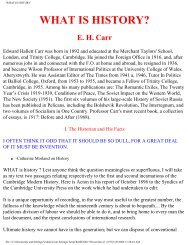The bronze age and the Celtic world - Universal History Library
The bronze age and the Celtic world - Universal History Library
The bronze age and the Celtic world - Universal History Library
You also want an ePaper? Increase the reach of your titles
YUMPU automatically turns print PDFs into web optimized ePapers that Google loves.
66 THE BRONZE AGE AND THE CELTIC WORLD<br />
<strong>The</strong> cause of this interruption is uncertain, but it is perhaps permissible to suggest that<br />
<strong>the</strong> inhabitants of Hissarhk H., like <strong>the</strong>ir successors in Hissarlik VL, held <strong>the</strong> straits<br />
<strong>and</strong> so restricted <strong>the</strong> traffic through it as to kill it. <strong>The</strong> disappearance of <strong>the</strong> type A.<br />
culture must certainly be equated approximately with <strong>the</strong> rise of Hissarhk IL, for, as<br />
we shall see, <strong>the</strong> disappearance of Type B. culture practically s5mchronises with <strong>the</strong><br />
destruction of that city.<br />
As we have seen this people usually, <strong>and</strong> perhaps invariably cremated <strong>the</strong>ir dead,<br />
for <strong>the</strong> skeletons referred to by M. Chvojka,'' may not have belonged to this period ;<br />
any case <strong>the</strong>y have not been described. We have, <strong>the</strong>refore, no direct evidence of<br />
<strong>the</strong>ir physical characters <strong>and</strong> racial affinities. Some years ago Sir Arthur Keith, '^<br />
discussing <strong>the</strong> origin of <strong>the</strong> " Bronze <strong>age</strong> invaders of Britain," a people which I shall<br />
describe in <strong>the</strong> next chapter by <strong>the</strong> name of <strong>the</strong> Beaker-folk, argued with much force<br />
that <strong>the</strong>y must have set out from Gahcia. As <strong>the</strong>y reached Britain about or perhaps<br />
before 2000 B.C., <strong>the</strong>y must have left Gahcia still earlier, that is to say about <strong>the</strong> time<br />
that Tripolje settlements of type B. came to an end. For this reason I argued in 1916''<br />
that <strong>the</strong> Tripolje culture was due to <strong>the</strong> Beaker-folk, <strong>and</strong> I see no reason to-day to<br />
change my mind.<br />
Now <strong>the</strong> Beaker-folk, often called Bronze Age or Round Barrow men, are ra<strong>the</strong>r<br />
tall, strongly built, <strong>and</strong> with ra<strong>the</strong>r broad heads. <strong>The</strong>y have often been termed Alpine,<br />
but as Keith has shown, <strong>the</strong>y differ in many important particulars from <strong>the</strong> typical<br />
Alpines in <strong>the</strong> mountain zone. <strong>The</strong> difference lies mainly in this : <strong>the</strong>y are taller,<br />
more robust, <strong>the</strong>ir cranial index is lower, seldom rising above 84, while <strong>the</strong> conspicuous<br />
flattening of <strong>the</strong> occiput is absent,'"<br />
<strong>The</strong>se characters suggest a cross between <strong>the</strong> Alpine <strong>and</strong> Nordic types, <strong>and</strong> this<br />
is a possible solution, as <strong>the</strong>y he midway between <strong>the</strong> Alpines of <strong>the</strong> mountain zone<br />
<strong>and</strong> ano<strong>the</strong>r people, to be described next, who occupied <strong>the</strong> steppe l<strong>and</strong>s to <strong>the</strong> east,<br />
<strong>and</strong> who closely resemble <strong>the</strong> Nordic tj^e. On <strong>the</strong> o<strong>the</strong>r h<strong>and</strong> <strong>the</strong> Beaker-folk type<br />
seems to have remained fairly uniform, so that, if it is a cross, it is a stable cross, which<br />
'7 Chvojka (1904) 223, quoted by Minns (1913) 140.<br />
'8 Keith (1915) 2. 21.<br />
19 Peake (1916) 1. 165, 166.<br />
" Keith (1915) 2. 13.<br />
in







